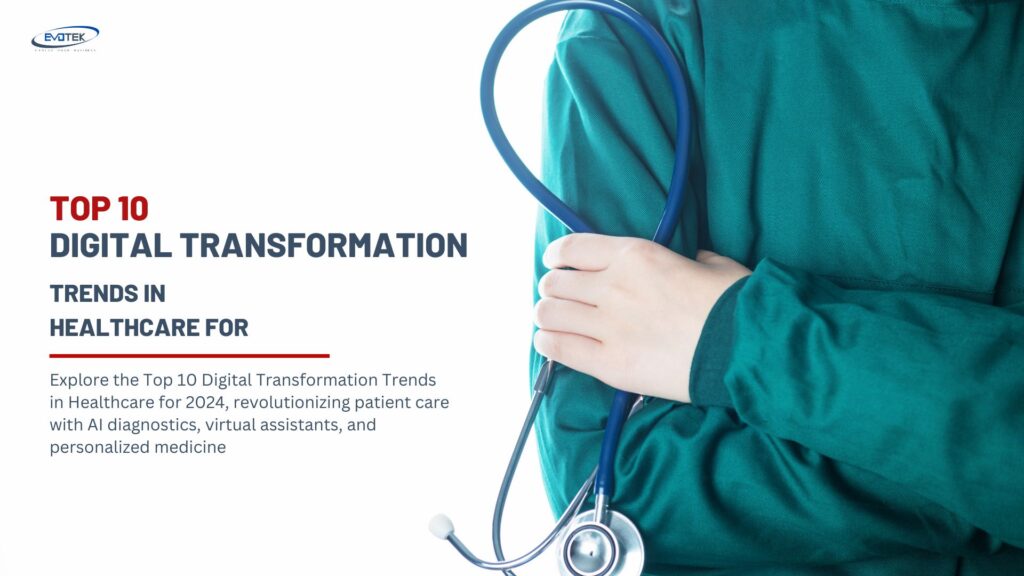The healthcare industry has had to face many significant challenges in recent years. From the global crisis caused by the COVID-19 pandemic to changes in population trends and increasing demand for healthcare, healthcare organizations must constantly adapt and innovate. In this context, digital transformation plays a crucial role, leading the healthcare industry into the era of personalized healthcare, digital services, and evidence-based medicine.
Monitoring patients’ health remotely and using artificial intelligence (AI) in diagnosis helps reduce the burden on healthcare facilities, while enhancing the quality of personalized care. Furthermore, medical data analysis opens up the possibility of making more accurate decisions, efficient resource management, improving operational efficiency, and enhancing treatment outcomes.
However, digital transformation in the healthcare field goes even further. This includes implementing machine learning (ML) models for personalized medicine and using AI to early detect pathological signs in fields like dermatology, pathology, or diagnostic imaging. These are just a few examples, but it is clear that digital transformation plays a crucial role in optimizing healthcare operations, bringing significant benefits to both patients and the healthcare system.
Importance of digital transformation in healthcare industry.
The driving force behind digital transformation in the healthcare field extends beyond government policies and incentives. This is an inevitable trend that brings benefits to both patients and healthcare service providers. Digital healthcare solutions bring many opportunities to improve service quality and operational efficiency.
- Digital technologies like telehealth, wearable health monitoring devices, and AI-supported diagnostic systems allow continuous monitoring and real-time data analysis. This helps to provide more accurate diagnoses and highly personalized treatment plans, enhancing the quality of care for patients.
- Furthermore, digital transformation helps overcome geographical barriers in accessing healthcare services. Thanks to telemedicine technology, patients in remote or underserved areas can receive online consultation and treatment without the need to travel. This ensures more comprehensive and equitable healthcare services on a wide scale.
- Applying automation and AI to administrative tasks such as planning, compliance checks, and payments helps reduce overall operational costs. As a result, healthcare units can focus resources on essential patient-oriented activities instead of putting too much effort into paperwork.
- The digitization and system integration process helps collect, store, and analyze health data conveniently, providing strong support for medical research as well as policy-making and resource allocation for a more effective healthcare system.
- Applying big data analytics and forecasting models helps early detection of high-risk groups. This allows for early prevention measures to be implemented before the condition becomes serious or chronic. This reflects the shifting trend in healthcare from treatment to prevention.
Top 10 trends digital transformation in healthcare 2024
The healthcare industry is facing increasing pressure to digitalize. According to a recent survey, only 7% of businesses in healthcare and pharmaceutical sector have completed digitalization process, a much lower figure compared to 15% in other industries. To transform traditional standard practices into a modern digital healthcare system by 2024, organizations need a comprehensive vision of the constantly evolving healthcare environment.
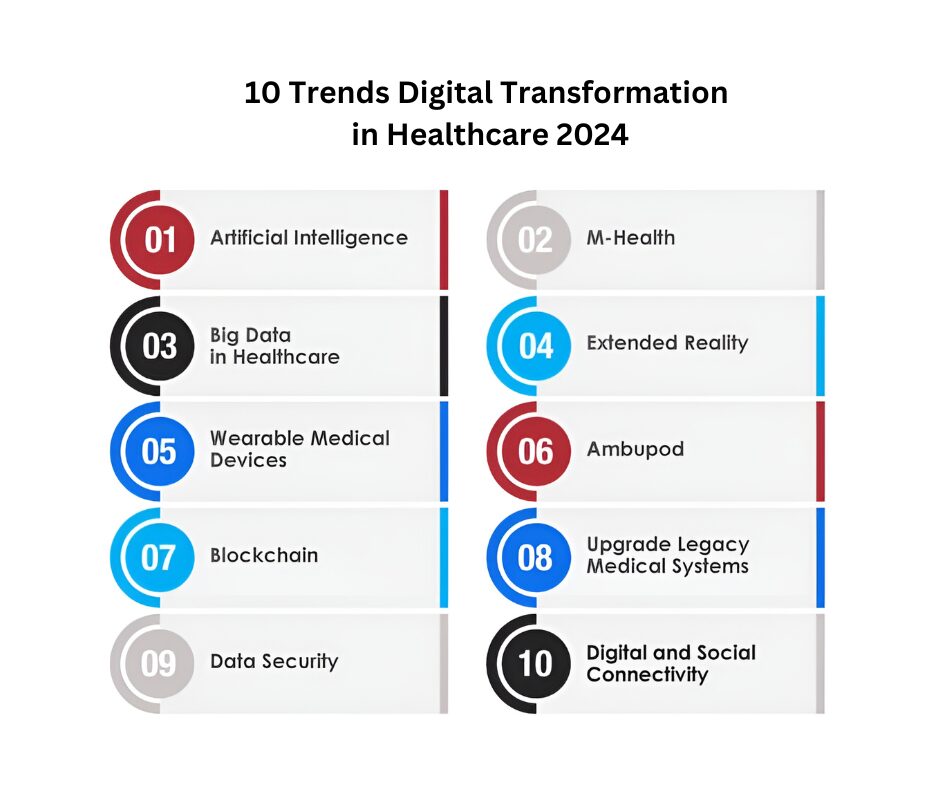
1. Artificial Intelligence (AI)
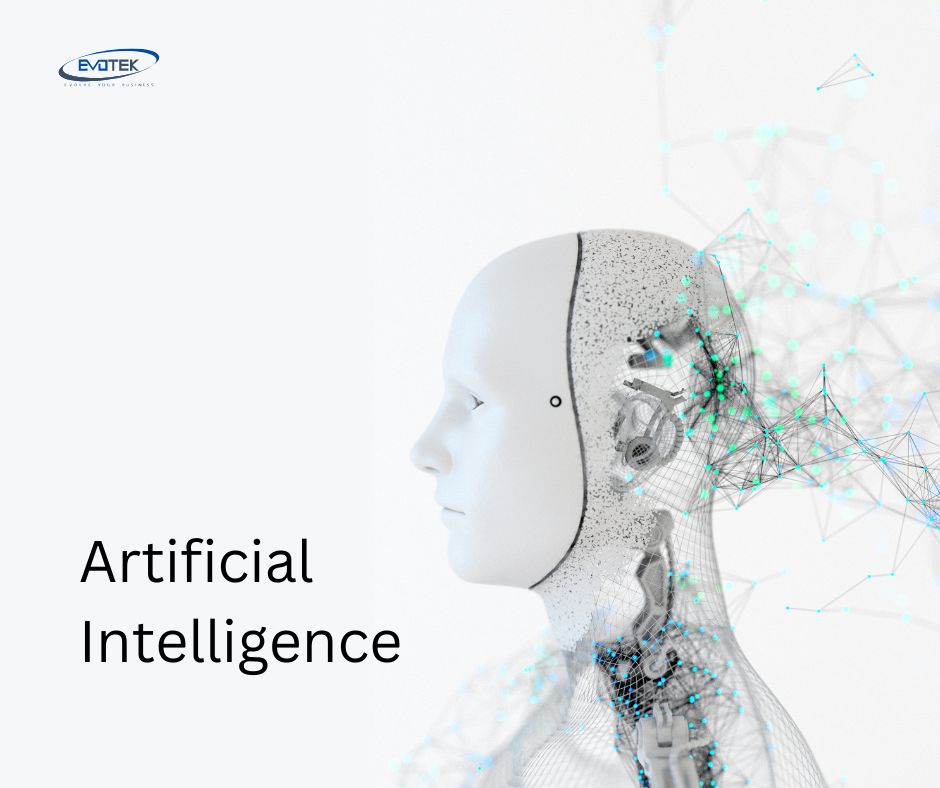
According to a recent research report from Morgan Stanley, spending momentum on artificial intelligence (AI) and machine learning (ML) in the healthcare sector is expected to exceed 10.5% growth by the end of the year. 2024. This reflects the growing trend of AI application in many aspects of healthcare, from patient communication, surgical support to pharmaceutical research and development.
In the field of data management, AI plays an important role in automating processes such as document processing, electronic health record (EHR) management, genetic data, and data from devices according to data. Wearable health monitoring and medical image processing. AI applications help healthcare providers effectively process huge volumes of information and make timely decisions, contributing to improving productivity and operational efficiency.
In the field of pharmaceutical research and development, AI plays an indispensable role in improving the drug discovery and design process.
A prominent example is DeepMind’s AlphaFold2 AI technology, which helps predict the 3D spatial structure of proteins just from the amino acid sequence. This achievement was shared publicly via the Google Colab platform, driving breakthroughs in this key area.
In addition, other advanced AI models such as DeepAffinity are being developed with the ability to predict the relationship between drug molecules and target proteins through combining recurrent neural networks and convolutional neural networks. . These applications open up prospects for more rapid and efficient design and discovery of new drugs.
2. m – Health
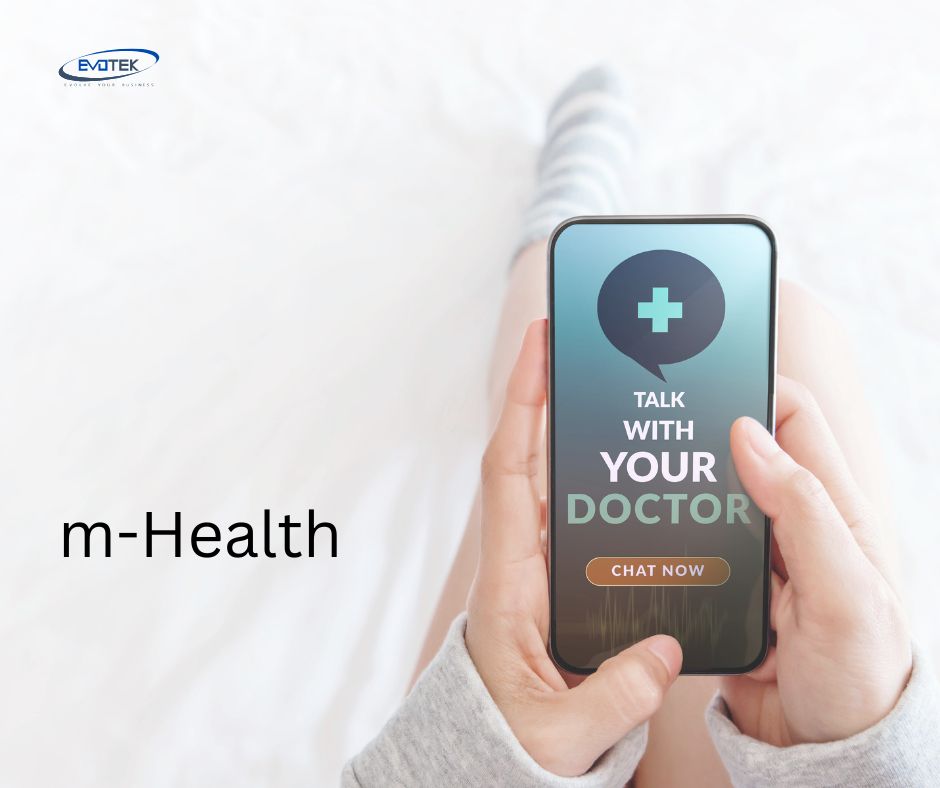
Mobile health or m-Health allows users to manage their health more proactively and effectively. This field involves the use of smartphones and advanced wireless technologies to monitor health indicators, schedule medical appointments, and gain more convenient access to medical resources. .
M-Health brings many great benefits in the fields of preventive health care, telemedicine and chronic disease management. With continuous connectivity, it helps effectively track and monitor user health issues, while providing appropriate timely interventions without having to go directly to medical facilities.
The development of m-Health fits well with the strong digital transformation trend in the healthcare sector. It drives advances in patient-centered service delivery, enhancing engagement and technology understanding of both patients and providers.
With the number of global smartphone users forecast to reach 7.1 billion by 2024 and still growing, demand for online healthcare services will certainly continue to increase. for many years to come. This huge potential market requires healthcare organizations to be prepared to welcome the wave of digital transformation, increase the deployment of m-Health solutions, to provide better services to a growing population. a large number of patients on many new digital platforms.
3. Big data in healthcare
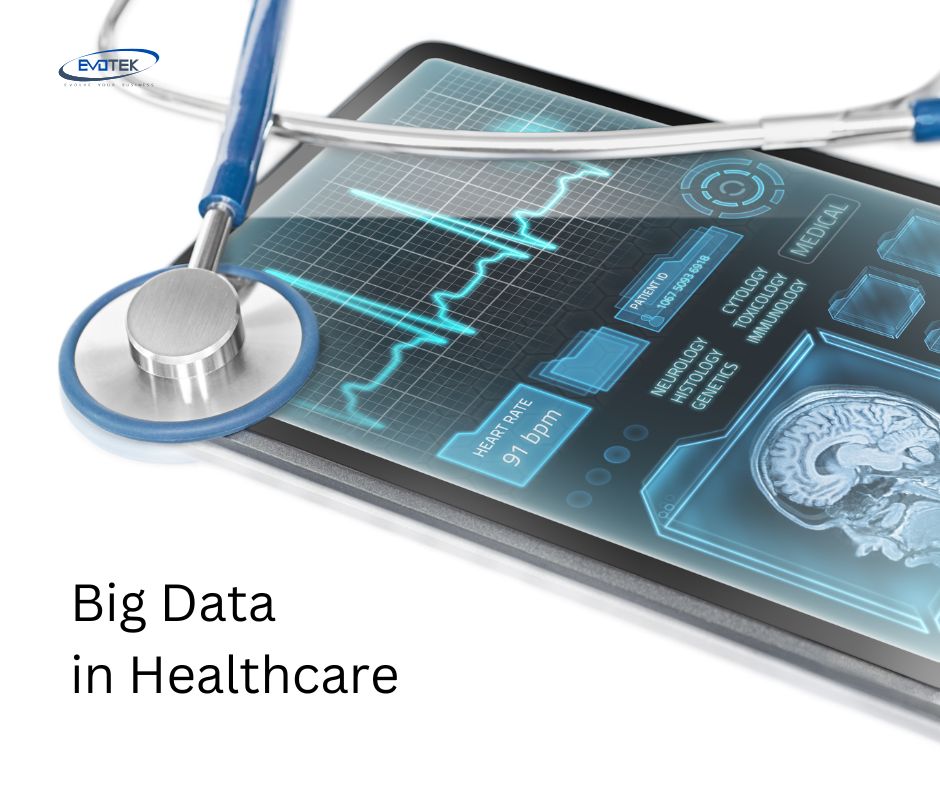
The healthcare industry is receiving great benefits from effectively exploiting the huge information resources from Big data. Large-scale data analytics supports disease prediction, unlocks the possibility of personalizing treatment, and improves the efficiency of medical care delivery.
One of the typical applications is the ability to detect and identify groups of “regularly re-examined” patients in emergency rooms. Notably, this group accounts for 28% of all visits to emergency departments. By analyzing big data, healthcare providers can identify patients in this high-risk group and establish medical contingency plans, aimed at preventing them from returning. emergency room many times unnecessarily.
Furthermore, Big Data analysis also allows predicting hospitalization rates more accurately. From there, medical units can allocate appropriate human resources to best meet patient care needs. This not only saves costs and resources, but also significantly reduces waiting times for patients in emergency departments.
The applications of Big Data in healthcare do not stop there. They also provide insights into diseases, genetic characteristics and environmental factors that affect human health. From there, we can develop medical care and treatment methods suitable for each individual, marking an important step in the direction of modern medicine – personalization of treatment.
4. VR/AR
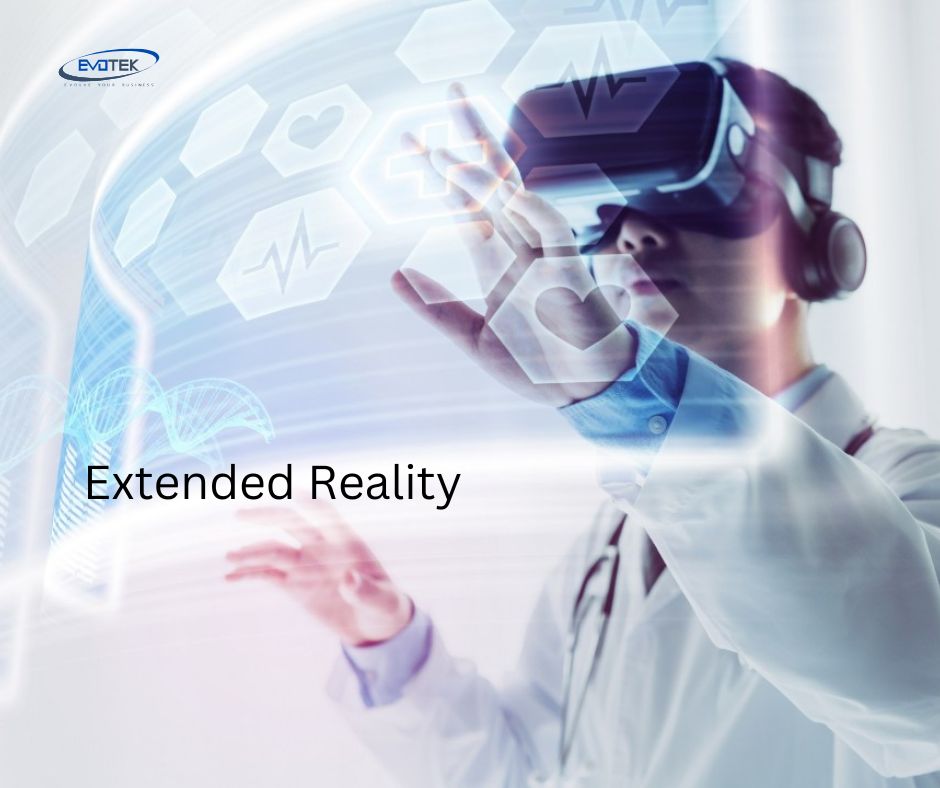
AR/VR solutions can be a game changer in the healthcare industry. AR/VR facilitates remote consultations and treatments, making it possible for doctors to share visual data and real-time guidance with patients even when they are not physically present. This is extremely important in the context of more and more areas lacking high-quality medical human resources.
In the field of rehabilitation, AR technology opens up many possibilities for designing highly interactive and engaging training methods for patients. These applications help increase patient motivation and participation, contributing to a more effective recovery process.
Meanwhile, VR brings breakthroughs in medical training. Doctors can be trained in a virtual environment just like in real-life situations, helping to improve their clinical skills and medical knowledge without putting patients at risk.
In addition, advances in VR also open up many new opportunities in treating diseases, especially psychological disorders such as PTSD, fear of water, fear of heights,… Medical centers are leveraging VR therapy to help patients face and overcome phobias safely and effectively.
5. wearables
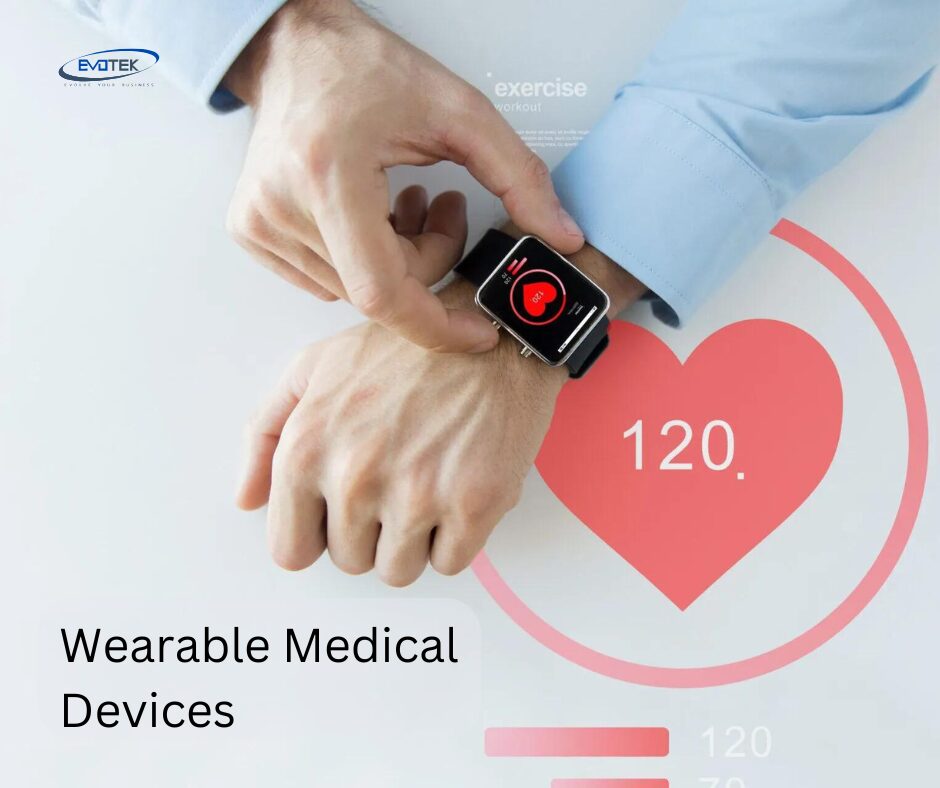
Looking back a decade ago, most people felt comfortable with just getting annual checkups or seeking medical attention for serious problems. However, in today’s digital era, people’s perceptions have changed significantly. Modern patients increasingly focus on prevention, maintaining good health early on, and expect to have their medical information updated more frequently.
To meet this new demand, healthcare organizations are actively investing in wearable technology. These devices allow for continuous monitoring, recording and analysis of the user’s vital health signs, such as heart rate, physical activity, oxygen levels and sweat output. From detailed and continuously updated data, medical professionals can predict risks and detect potential serious medical conditions early.
6. Ambupod
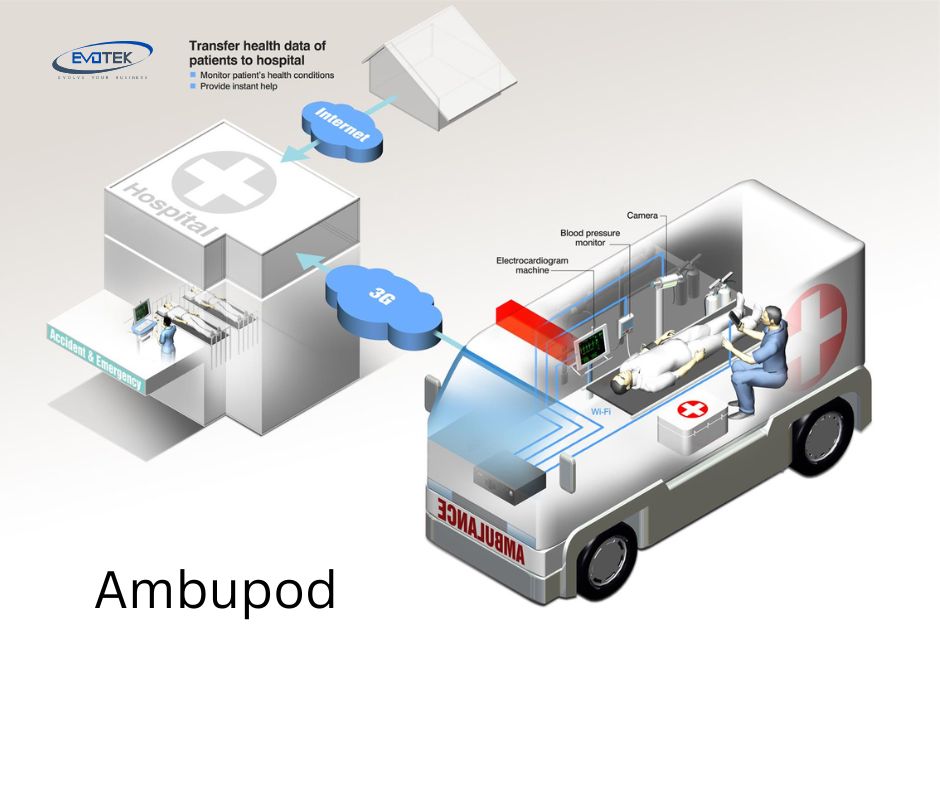
Ambupod is truly a groundbreaking innovation in the field of emergency medicine. Ambupod is a modern digital ambulance, equipped with advanced technology to transmit real-time health data of patients to hospitals.
Ambupod is equipped with the most modern medical equipment, monitoring tools and telemetry equipment. Thanks to this digital connection system, medical staff can continuously transmit important medical data of patients throughout their journey to the hospital. This helps doctors at the hospital to receive complete and accurate information about the patient’s condition right from the moment they board the ambulance.
Thanks to Ambupod, hospitals can be prepared and begin providing necessary medical care as soon as the ambulance arrives, especially for serious emergencies. The continuous connection of health information between ambulances and hospitals helps to significantly shorten response time and timely intervention, significantly improving the patient’s chance of survival.
7. Blockchain
According to recent reports, the healthcare blockchain technology market is expected to reach a staggering $29.76 billion by 2029.
This number reflects the growing acceptance of blockchain in the pharmaceutical and healthcare sectors. Many leading businesses have realized the great potential of this technology and are willing to pour millions of dollars to invest in this promising market.
The growing interest in blockchain in healthcare is partly due to the significant benefits it brings. This distributed ledger technology enables secure, transparent, and efficient storage and sharing of medical data between stakeholders. This helps increase security, reduce risk and improve efficiency in the exchange of medical information.
Besides, blockchain also opens up new applications in tracking pharmaceutical supply chains, controlling counterfeit drugs, managing medical records and paying medical costs. These application areas are being aggressively exploited by pharmaceutical and healthcare companies to improve efficiency, transparency and accountability.
8. Upgrade the legacy medical system
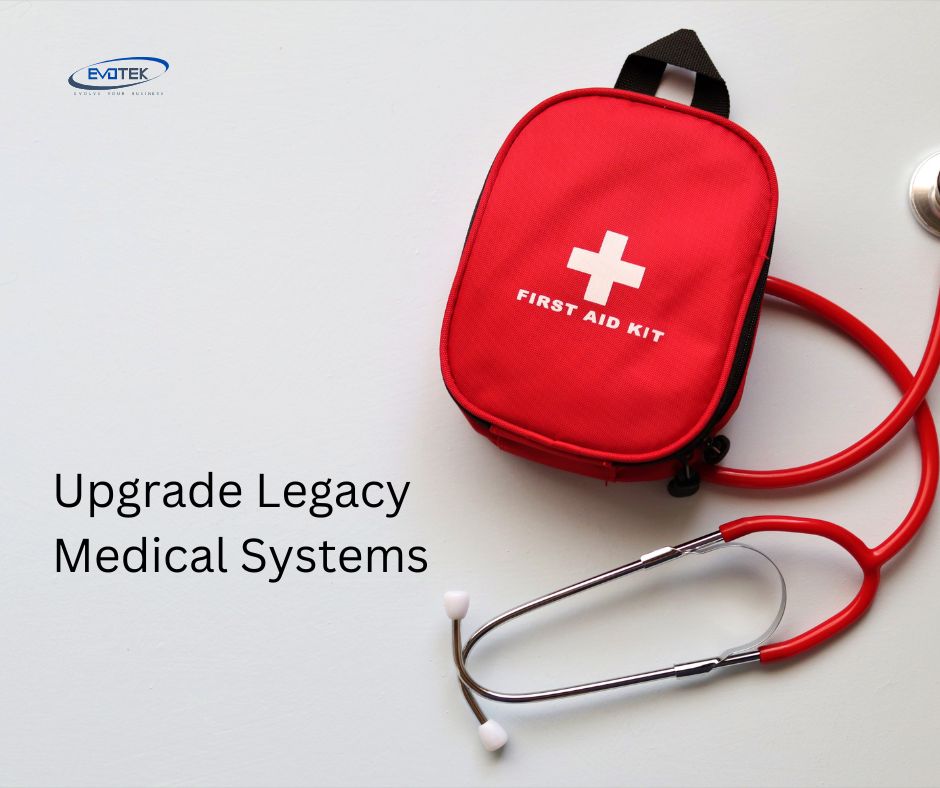
According to a report from Kaspersky Lab, up to 73% of medical systems are still operating on the old operating system platform. This not only leaves them vulnerable to cyberattacks and data breaches, but also hinders their ability to keep up with the changes and innovations needed to enhance the patient care experience.
Therefore, the main trend in 2024 will be the transition from legacy medical systems to modern operating systems or redesigning them based on specific technical requirements and operational capabilities. These modernization efforts must ensure data continuity and seamless integration with other healthcare systems such as laboratory information systems (LIS) and electronic health records ( EHR).
By upgrading their core technology infrastructure, healthcare organizations will be better able to respond to cybersecurity threats, while also opening up more opportunities to exploit new technologies such as intelligence. artificial intelligence, large-scale data analytics and cloud computing to improve care.
9. Data security
The massive data breach of Postmeds (Truepill company) in 2023, affecting more than 2.3 million users globally, exposed a serious gap in information security in the industry. This incident highlights the importance of ensuring every healthcare organization is in strict compliance with data protection regulations such as HIPAA and GDPR and has appropriate security controls in place.
Data security and privacy must always be at the forefront of everything the healthcare industry does. Only by fully implementing these standards can we protect sensitive data, maintain patient trust and continuously improve the quality of medical services.
10. Connect to social networks
Social media has become a common platform for people to share their thoughts and for industries to keep up with new trends. According to a report, the average person spends about 194 minutes a day on social networking sites.
Healthcare providers understand the inclusivity of social media and leverage social media platforms to ask patients to share their concerns and seek advice. They can also use the SM platform to spread awareness about health-related information. With the trend of digital transformation, SM’s goal of becoming a healthcare channel will reach new heights in the coming years.
Health care industry digital transformation market in Vietnam
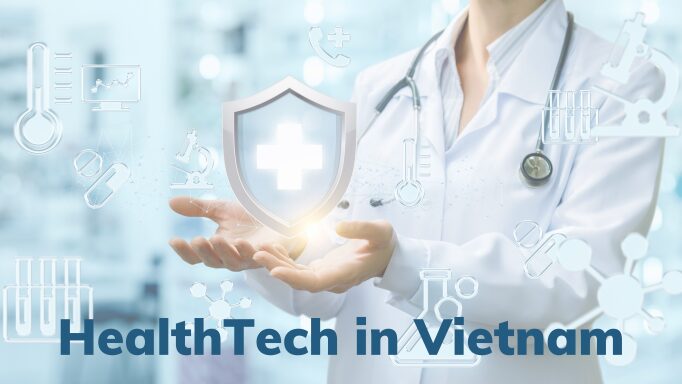
Although still young, the medical digital transformation market in Vietnam is gradually emerging and promises many development potentials in the future.
One of the key drivers driving digital transformation in the healthcare industry is the growing need to improve service quality, operational efficiency, reduce costs and expand access to medical services. economy, especially in remote areas.
Digital applications such as electronic medical records, telehealth, medical data management software and clinical decision support systems are gradually being deployed and applied in large hospitals.
Vietnam’s healthcare digital transformation market also receives strong support and investment from the Government. Many national policies and strategies have been proposed to promote the development and application of digital technology in the health sector, creating the basis and direction for this transformation. Public hospitals are also encouraged and budgeted to promote system digitalization.
In addition, the increase in the number of startups in the field of health technology (healthtech startups) also plays an important role in promoting digital transformation in Vietnam. These startups provide many innovative solutions that apply new technology such as AI, big data analysis and wearable health monitoring devices to health care.
How can Evotek help realize Digital Transformation in the Healthcare industry?
- Evotek solves various customer challenges related to digital applications, such as functionality, performance, security, usability, cross-device compatibility, and more.
- Our teams work closely with customers, using a variety of methodologies (Agile and DevOps) to deliver digital testing services for mobile and web applications.
- Our team conducts a thorough risk analysis of the system with a mitigation plan and prioritizes testing accordingly.
- We leverage AI to provide predictive analytics, allowing healthcare providers to anticipate potential quality issues and bottlenecks before they impact technical transformation projects. your digital.
- We have over 50 external healthcare experts and field consultants who will be available when the need arises, with all the healthcare tools and expert knowledge of technology as well as more than 50 testing consultants with extensive and in-depth practice experience.
- Our internal accelerators and dashboards (Tx-Automate digital transformation, Tx-HyperAutomate in healthcare, Tx-Insights, Tx-SmarTest, etc.) provide real-time insights Real-time visibility into QA progress, facilitating informed decision making and seamless communication.
To know more, contact us now.
